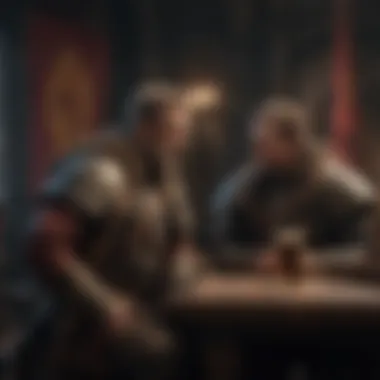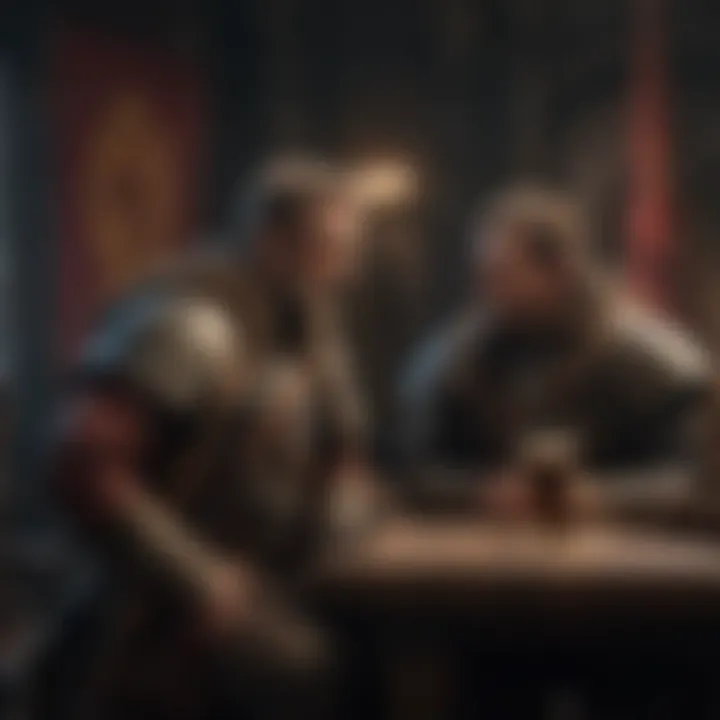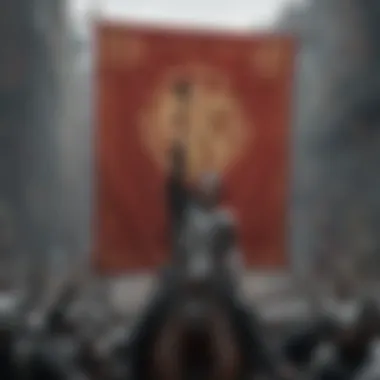The Role and Significance of Banner Men in Game of Thrones


Intro
In the intricate landscape of Game of Thrones, the significance of banner men is often overshadowed by the more prominent figures such as lords and kings. However, these vassals play a crucial role, establishing the foundation of feudal allegiances that drive the complex political dynamics of Westeros. The following sections will explore their historical context, character dynamics, responsibilities, and the implications of their actions within the broader narrative.
Character Dissections
In this section, we will analyze key banner men characters from Game of Thrones, examining their relationships with their lords and the impact they have on significant storylines throughout the series.
Key Characters
- Theon Greyjoy: A profound example of vassalage, Theon’s journey reflects the tension between loyalty and self-identity. Raised by Eddard Stark, he exemplifies the conflict of allegiance found within the houses of Westeros.
- Roose Bolton: As the Lord of the Dreadfort, Roose’s banner men illustrate the darker aspects of feudal loyalty. His ruthless nature influences his bannermen's actions, leading to pivotal betrayals that shape the narrative.
- Davos Seaworth: Known as the Onion Knight, Davos’s evolution from smuggler to a trusted advisor exhibits the value of wisdom and loyalty. His role as a banner man shows how dedication can rise above noble heritage.
Character Development Through the Series
Each character showcases the diverse trajectories of banner men. Theon’s betrayal and search for redemption, Roose’s cold pragmatism, and Davos’s moral compass highlight the varied responses to loyalty expectations. Their arcs reveal how personal choices of these vassals can dramatically impact their lords and the broader conflicts around them.
Impact on the Overarching Storyline
The actions of banner men often resonate beyond their immediate circles. Theon’s choices lead to the sacking of Winterfell, shaping alliances and enmities that ripple through the seasons. Roose's betrayal of Robb Stark at the Red Wedding significantly alters the power dynamics of Westeros. In contrast, Davos emerges as a voice of reason in chaotic times, influencing decisions that drive the narrative forward.
"In the game of thrones, you win or you die. There is no middle ground."
— Cersei Lannister
Responsibilities and Expectations
Banner men in Game of Thrones carry immense responsibilities tied to the honor and reputation of their houses. Yet, their roles encompass more than mere loyalty; they are strategic players in a dangerous game, bound by oaths that can lead to conflict or unity.
Duties of Banner Men
- Military Support: As vassals, their primary duty is to provide troops during conflicts. Their commitment during battles often proves pivotal in the fates of their lords.
- Political Alliances: They navigate intricate political terrains, often forging alliances through marriages or strategic support, impacting the balance of power.
- Resource Management: Banner men also supply wealth and resources that sustain their lords’ ambitions, making their roles integral in both economics and warfare.
In summary, the narratives central to banner men reveal a microcosm of the larger struggles in Game of Thrones, where fealty, honor, and personal ambition collide to shape the fate of Westeros.
Preamble to Banner Men
Understanding the role of banner men is crucial when analyzing the intricate political tapestry of Game of Thrones. Banner men serve as vassals to lords, representing a system of feudal loyalty and obligation that forms the backbone of Westerosi society. This article explores their significance, examining how these relationships influence power dynamics, shape alliances, and catalyze conflicts throughout the series. The role of banner men transcends mere military duty; it speaks to the complexities of honor, betrayal, and loyalty that define the narrative landscape.
Defining Banner Men
In the context of Game of Thrones, banner men are the vassals who owe their allegiance to a lord, often fighting under the banner of their house in times of war. These men are not just soldiers; they hold a position of honor and responsibility. Their loyalty is pledged through a formal oath that emphasizes their commitment to their superior. Each banner man is expected to contribute military support and resources to their lord's cause. This definition sets the foundation for examining how banner men influence the events within the narrative.
Historical Context in Westeros
The concept of banner men is deeply rooted in the medieval-like history of Westeros. The land was shaped by centuries of conflict and evolving power structures. Historically, the relationships between lords and their banner men have mirrored real-world feudal systems. In Westeros, houses are often centralized around a single stronghold, with lords commanding loyalty from numerous banner men. Each of these relationships is steeped in tradition, with expectations surrounding honor and service. This historical context provides important background for understanding specific interactions between characters and their powerful lords, shaping much of the political intrigue that unfolds in the series.
"Loyalty is a virtue, but in a land such as Westeros, it can also be a deadly weakness."
This perspective on loyalty emphasizes the tension inherent in the bonds between lords and their banner men, offering readers insight into the motivations and actions of key characters.
The Feudal System of Westeros


Understanding the feudal system in Game of Thrones is essential to grasp the intricacies of power dynamics in Westeros. This hierarchical structure shapes the relationships between lords and their vassals, dictating alliances, loyalties, and conflicts. Lords hold significant authority over their lands and vassals. In turn, vassals, often known as banner men, owe allegiance to their lord, engaging in military service and offering counsel. This system creates a network of mutual dependence, where the stability of the realm hinges on the loyalty and capabilities of the banner men.
Lords and Their Vassals
Lords function as the epicenter of power in their respective regions. They possess lands granted by the crown, embodying both political and military authority. Their vassals, whether noble families or lesser houses, act as their enforcers and serve their lords with oaths of loyalty.
The relationships within this hierarchy are complex. A lord may lead numerous vassals, each with their own unique allegiances and motives. This can lead to tensions, particularly when a lord's decisions do not align with the interests of their banner men. For example, House Stark and its vassals, like House Karstark and House Umber, are bound by blood and historical ties. Their military might is a reflection of their loyalty, even in tumultuous times. Conversely, the Lannisters, known for their strategic marriages and wealth, hold sway over various banner men, like House Frey and House Tyrell, leveraging their resources for political gain.
The Oath of Fealty
The oath of fealty is a crucial part of the feudal system. It represents an unbreakable bond between lord and vassal. When a vassal pledges their loyalty, they accept the responsibilities that come with this commitment. They must provide military support during conflicts and attend to their lord's needs. The sacrifice of personal ambition for the greater good of the house is a recurring theme in Game of Thrones.
The failure of a banner man to uphold their oath can lead to dire consequences. For instance, when Robb Stark is betrayed by House Frey, it is not solely a personal betrayal, but a violation of the feudal system's core values. Through the betrayal, we see the fragility of loyalty and the intrinsic struggles inherent in feudal allegiances, making the oath a double-edged sword in the quest for power in Westeros.
Key Banner Men in the Series
In the Game of Thrones series, banner men serve a crucial role by supporting their lords and impacting the political scene in Westeros. Understanding the key banner men provides an insight into the dynamics of power, loyalty, and conflict throughout the story. They are not just fighters; their actions and allegiances shape events, making their significance profound.
The Starks and Their Banner Men
House Karstark
House Karstark is a notable banner house of the North, sworn to House Stark. Their loyalty is essential, particularly following the death of Rickard Karstark in battle. This house showcases a strong commitment to family and honor, reflecting the core values of the Stark family itself.
A key characteristic of House Karstark is their determination. The house’s readiness to fight for the North earns them respect among other houses. However, following the death of Robb Stark, their allegiance becomes tenuous, illustrating the complexity of loyalty in the game of power.
Unique to House Karstark is their connection to the old gods and the ancestral roots deep within North traditions. This commitment to heritage provides them strength but also poses a potential disadvantage when faced with shifting tides of politics.
House Umber
House Umber stands as another important banner house for the Starks. Their fierce demeanor and warrior spirit highlight their significance in the series. The house is known for its strength in battle and their historical ties to the Stark family.
House Umber's distinct feature is its unparalleled bravery. They are willing to confront any adversary to protect their loyalty to House Stark. However, this bravery may lead to rash decisions, affecting their strategic choices amidst the chaos of war.
The Lannisters' Allegiances
House Frey
House Frey is crucial to understanding Lannister alliances. Known infamously for the Red Wedding, House Frey's actions demonstrate how alliances can become treacherous. Their key characteristic is their calculating nature. They weigh opportunities and betrayals based on benefit.
The Freys' unique feature is their control of the Twins, a significant strategic location. This advantage grants them leverage in negotiations, although their betrayal tarnishes their reputation among other houses, leading to long-term consequences.
House Tyrell
House Tyrell is often viewed as a cunning and influential ally of the Lannisters. Their reputation for political maneuvering makes them significant in the ongoing power struggles. They are wealthy, which attracts many to their cause, ensuring their place in the political landscape.
A unique aspect of House Tyrell is their blooming gardens and connection to wealth, symbolizing their ability to cultivate not just flowers but also alliances. However, their reliance on riches can lead to overconfidence, making them vulnerable to shifting loyalties in a chaotic world.
The banner men of the Game of Thrones series reveal much about the nature of feudal allegiances and the consequences of political decisions.


Adventures and Responsibilities of Banner Men
The role of banner men is crucial in the Game of Thrones universe, woven into the tapestry of loyalty, warfare, and political intrigue. Their adventures are not just about following a lord into battle; they also encompass the deep responsibilities that come with vassalage. Understanding these elements provides insight into how these characters influence the broader narrative. The responsibilities of banner men extend beyond the battlefield to the court, where they function as both warriors and advisors. This dual role illustrates the complex nature of feudal allegiance in Westeros, highlighting the unpredictable relationship between loyalty and ambition.
Military Engagements
Banners in Battle
Banners in battle represent the loyalty and allegiance of banner men to their lords. These banners become symbols, often rallying points during conflicts. When banner men display their banners on the battlefield, it turns into a powerful spectacle of unity, where their courage and loyalty are evident. The presence of these banners can drastically affect the morale of soldiers. Seeing the banner of a reputable house can inspire troops or intimidate foes.
The unique feature of banners, in this context, is their ability to convey messages on the field. Unlike mere words, banners embody the history, honor, and reputation of houses. On the downside, the reliance on such symbols can lead to significant losses if they are captured or destroyed, as that may signal defeat or betrayal in the eyes of combatants.
Siege Warfare
Siege warfare presents a distinct aspect of military engagements for banner men. Sieges often test not only the resilience of the defenders but also the strategic acumen of the attacking forces. Banner men must adapt their strategies while ensuring their lords' objectives are met. The effectiveness of their role becomes pronounced in long-lasting sieges where supply lines and morale are key.
The characteristic nature of siege warfare requires unity and coordination among banner men. They must hold fast under pressure and be able to communicate plans amid chaos. However, this scenario poses severe disadvantages; being under siege can deplete resources swiftly, and a prolonged conflict can lead to defections or dissent among the ranks.
Political Maneuvering
Counsel to Lords
Counsel to lords is an essential responsibility for banner men that often goes unnoticed. They are expected to advise their lords on various matters, ranging from military tactics to dealing with rival houses. Given their deep understanding of the land and people, their insights are invaluable. A banner man's perspective can offer fresh angles on unfolding conflicts or potential alliances.
The significance of this counsel lies in its potential to shape the decisions made by their lords. However, the delicate nature of this role means that poor counsel can lead to disastrous outcomes. The wisdom of one banner man could shift the power dynamics and alter the fates of houses.
The Nature of Betrayal
The nature of betrayal is a critical theme involving banner men. In a world where loyalty is regularly tested, the choices made by banner men can lead to shifting allegiances that have profound implications. Instances of betrayal occur frequently, often catalyzed by personal ambition or desire for survival. This dynamic reveals the inherent conflict between personal ethics and loyalty to one's lord.
The unique feature of betrayal in this context is how it serves as a plot device that deepens the narrative complexity of Game of Thrones. Betrayals can change the course of wars and shift allegiances unexpectedly. While betrayal serves to advance the story, it often results in devastating consequences, further complicating the fabric of loyalty and honor that banner men must navigate.
The Impact of Banner Men on the Plot
The role of banner men significantly impacts the narrative of Game of Thrones. They are not just secondary characters but are often pivotal in key plot developments. Their allegiances, betrayals, and actions drive much of the series' conflict and intrigue. By exploring their influence, one gains a deeper understanding of the series' complex socio-political landscape. Banner men reflect the themes of loyalty, ambition, and honor, and their decisions often lead to crucial turning points in the story.
Catalysts for Conflict
The Stark-Lannister Feud
The Stark-Lannister feud serves as a primary conflict in the series. This rivalry originates from both personal and political grievances. The key characteristic is the mistrust between the two families fueled by power struggles. This feud creates a compelling narrative that demonstrates how allegiance to a house affects personal relationships. The Stark-Lannister conflict exemplifies the beneficial choice for this article as it highlights the direct impact of banner men in the situations resulting in warfare.
One unique feature of this conflict is the role of banner men, such as House Karstark and House Frey. They influence decisions significantly, often shifting loyalty based on self-interest. This can be seen as both an advantage and disadvantage; while they provide manpower in battles, their lack of steadfast loyalty undermines the broader alliances.
The War of the Five Kings
The War of the Five Kings is another defining moment in the series. This conflict illustrates the chaotic power vacuum created by the death of King Robert Baratheon. The key characteristic of this war is its complexity, with multiple houses trying to secure the Iron Throne. The war presents a popular choice in the context of this article because it showcases how banner men, like House Tyrell, play crucial roles.
The unique feature of this conflict lies in the fragmented loyalty among the banner men. Leaders' ambitions often overshadow their responsibilities, leading to betrayals and unexpected alliances. The advantages here include increased tension and unpredictability, which maintain viewer engagement. However, the downside is the potential confusion regarding motivations and alliances.


Parallel Motivations
Loyalty vs. Ambition
The theme of loyalty versus ambition runs deep in Game of Thrones. This struggle is illustrated through characters who must choose between serving their lords or pursuing their desires. The key characteristic is the tension between these two forces, often leading to tragic consequences. This aspect provides a beneficial framework for understanding the motivations of various characters in the series.
One unique feature is how banner men often find themselves torn between loyalty to their house and personal ambition. This conflict illustrates the complexity of their roles. On one hand, loyalty can offer stability; on the other, ambition may lead to personal glory but at a cost.
Honor in the Face of Adversity
Honor often stands at odds with survival in the Game of Thrones universe. This theme highlights the choices banner men must make when faced with dire situations. The key characteristic is that characters like Ned Stark embody the concept of honor, while others may choose pragmatism over principle. This aspect is a popular inclusion for this article, as it delves into the moral dilemmas faced by characters.
A unique feature of this theme is the varied interpretations of honor among different banner men. For some, honor leads to noble decisions, while for others, it becomes an obstacle. This diversity in understanding can lead to both advantages, such as rich character development, and disadvantages, like fragmented loyalty and trust within alliances.
The intricacies of loyalty and honor among banner men deepen both the character development and plot complexities within the Game of Thrones narrative.
The Decline of the Banner Man System
The decline of the banner man system is a crucial aspect to understand within the complex interplay of power and loyalty in Game of Thrones. This system, once a centerpiece of medieval feudal structures, begins to unravel as the narrative progresses. The shift away from traditional allegiances reflects broader themes of ambition and betrayal, influencing both character arcs and overarching plot developments.
Changing Loyalties
Housebolted Betrayals
Housebolted betrayals illustrate how deeply personal ambitions can disrupt feudal loyalties. These betrayals often occur when vassals prioritize their aspirations over their commitments to their lords. An example of this is the infamous betrayal by the Freys during the Red Wedding. Here, loyalty to the Stark family is abandoned in favor of a political alliance that promises personal gain.
This type of betrayal highlights a key characteristic: the fragility of loyalty. Once steadfast, allegiances can shift dramatically under the weight of ambition. The allure of power shifts the focus away from historical ties, marking a significant transition in the episode's narrative.
The unique feature of housebolted betrayals is their immediate impact. They reshape alliances and can lead to devastating consequences. The direct betrayal can result in loss of life and land for the lords involved, ultimately altering the power dynamics in Westeros. This aspect is beneficial to the article as it underscores the precarious nature of loyalty within feudal systems, contributing to the overall understanding of banner men’s roles in shifting allegiances.
The New Politics of Power
The new politics of power emerge as a counterbalance to traditional feudal practices. In the world of Game of Thrones, political maneuvering begins to prioritize strategic advantage over fealty. Characters such as Tyrion Lannister and Petyr Baelish embody this shift, relying on cunning rather than loyalty to climb the ranks of power.
A key characteristic of this new political landscape is its focus on individual agency. Unlike the banner men who acted as vassals to lords, many characters engage with the system on their own terms. This independence is reflective of a growing sense of self-interest that replaces collective loyalty.
The unique feature here is how this new political environment allows for fluidity in power structures. Characters can rise and fall based on merit or manipulation, rather than strictly adhering to noble lineages. However, this can lead to unstable governance, as seen through the chaotic wars and splintered factions throughout the series. The new politics of power reveals both advantages and disadvantages, highlighting the tension between personal ambition and communal stability.
The Rise of Individualism
The rise of individualism is an inevitable result of the decline of the banner man system. Characters increasingly act in accordance with their personal goals, often questioning the traditions that once dictated their lives. As Game of Thrones unfolds, this shift becomes a defining feature of the narrative. The stark contrast between tradition and self-determination not only shapes characters’ decisions but also redefines the very framework of power in Westeros.
Epilogue
The conclusion of this article highlights the vital role banner men play in the complex world of Game of Thrones. Their relationships with lords reveal deep insights into power structures and loyalty in Westeros. Understanding these dynamics gives readers a clearer perspective on the motivations that drive characters' actions in the series. The loyalty shown by banner men is not just personal; it ties into broader themes of honor, betrayal, and the burdens of fealty.
Summation of Significance
Banner men serve as essential pillars within the narrative framework of Game of Thrones. They are not mere background figures; rather, they embody the feudal obligations that define the political landscape of Westeros. Through their unwavering commitment, they showcase themes of loyalty against a backdrop of ambition. Their actions often steer conflicts, influencing the fate of entire houses. The intricacies of their relationships with their lords illustrate the delicate balance of power in a world where betrayal is commonplace.
Legacy of Banner Men in Westeros
The legacy of banner men in Game of Thrones is profound. As political allegiances shift, the traditional roles of banner men become challenged. Their stories contribute to an evolving understanding of honor and duty. The shift toward individualism represents a pivotal change in Westeros, where personal ambition can supersede feudal loyalty. Although the decline of the banner man system marks a transition, the impact of these characters remains integral to the series' exploration of power and its implications.
"In times of chaos, the bonds forged through oaths are tested the most."
In summarizing their contributions, it becomes evident that banner men are essential to Game of Thrones. Their significance extends beyond individual tales; it is embedded within the narrative’s core.



